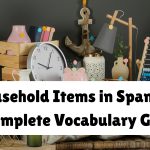The Conditional tense in Spanish is a bit like the English ‘would.’ It’s used not just for imagining what could happen, but also for being polite or guessing about things.
This tense works with all verbs, regular and irregular, and can even be combined to form the Conditional Perfect, adding depth to stories and discussions.
But, to really get it, you need to look closely at how it’s built and used in different situations. Let’s dive deeper into this tense. It’s interesting to see how it changes the way we talk and reflects different aspects of culture.
What is the Spanish Conditional Tense?
The Spanish conditional tense is like using ‘would’ with a verb in English.
It helps you talk about what could happen, ask for things nicely, or guess what might occur.
It’s really useful for showing possibilities or being polite when you’re speaking Spanish.
How to Conjugate the Spanish Conditional
To get a grip on the Spanish conditional tense, you need to know the regular and the tricky irregular forms. There’s something called the conditional perfect. It uses the conditional form of ‘haber’ and a past participle. Think of it as talking about things that could have happened but didn’t.
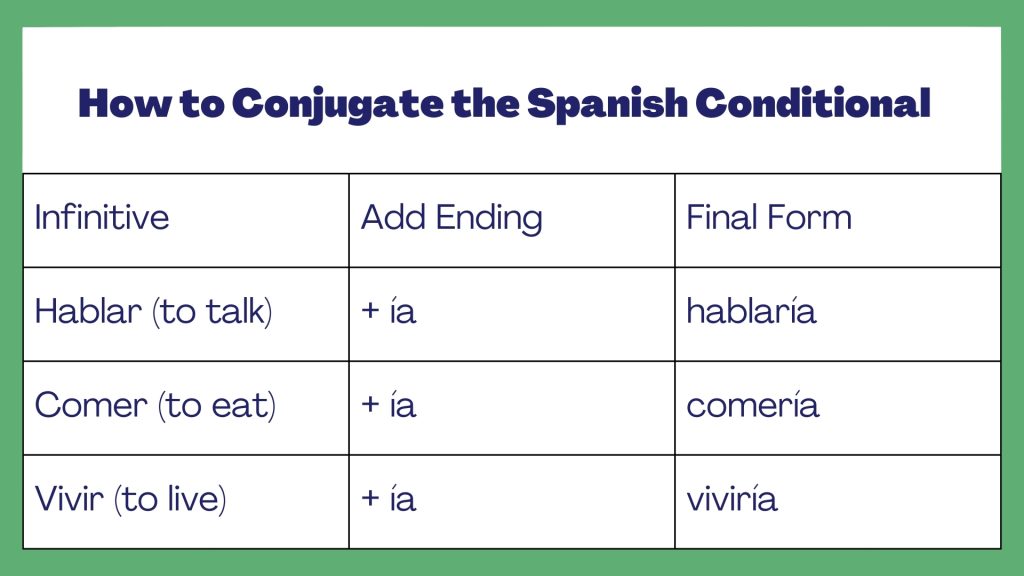
Plus, some verbs change their stems in weird ways when you put them in the conditional. You’ll want to keep an eye on those irregulars to use them right.
| Subject | Verb: Hablar (to talk) | Verb: Comer (to eat) | Verb: Vivir (to live) |
|---|---|---|---|
| Yo | hablaría | comería | viviría |
| Tú | hablarías | comerías | vivirías |
| Él/Ella/Usted | hablaría | comería | viviría |
| Nosotros | hablaríamos | comeríamos | viviríamos |
| Vosotros | hablaríais | comeríais | viviríais |
| Ellos/Ellas/Ustedes | hablarían | comerían | vivirían |
💡 Shortcut: Same endings for all verbs, no stem change needed!
Unlock the mystery of Spanish words that start with X – read now!
Spanish Conditional Perfect
To get the hang of the Spanish Conditional Perfect, start by learning how to use the conditional form of the verb ‘haber’. You’ll use forms like habría, habrías, and so on.
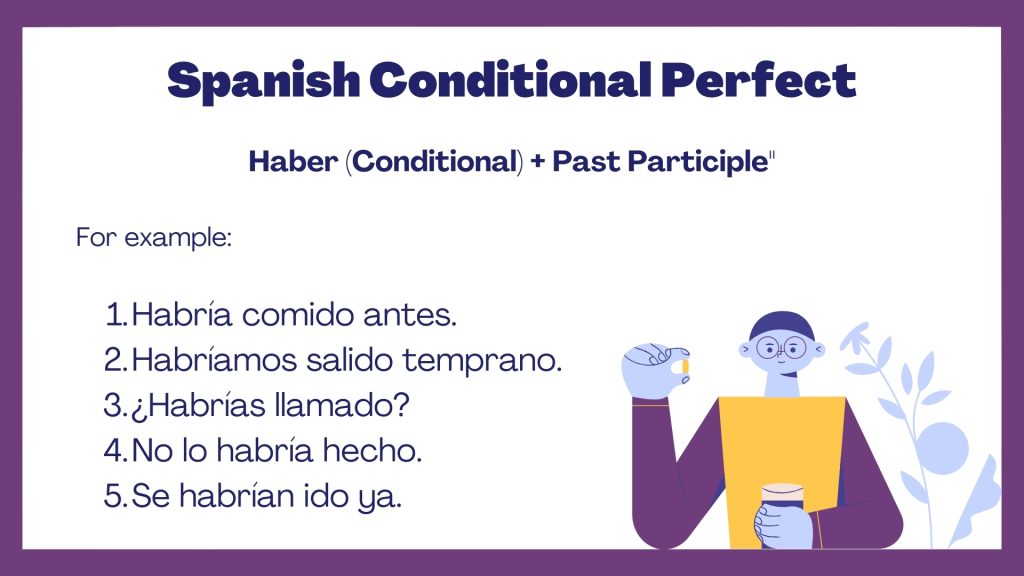
Next, tack on the past participle of the verb you’re dealing with. This tense is handy for talking about things that might have happened but didn’t, or imagining different outcomes in the past.
Formula:
haber (in conditional) + past participle
| Subject | Haber | Example (via Comer) | English Meaning |
|---|---|---|---|
| Yo | habría | habría comido | I would have eaten |
| Tú | habrías | habrías comido | You would have eaten |
| Él/Ella/Usted | habría | habría comido | He/She/You would have eaten |
| Nosotros | habríamos | habríamos comido | We would have eaten |
| Vosotros | habríais | habríais comido | You all would have eaten |
| Ellos/Ellas/Ustedes | habrían | habrían comido | They/You all would have eaten |
Irregular Verbs in the Conditional Tense
Irregular verbs in the Spanish conditional tense can be a bit tricky. They don’t follow the regular rules and change their forms. For instance, ‘tener’ changes to ‘tendr-‘, ‘poder’ becomes ‘podr-‘, and ‘venir’ turns into ‘vendr-‘.
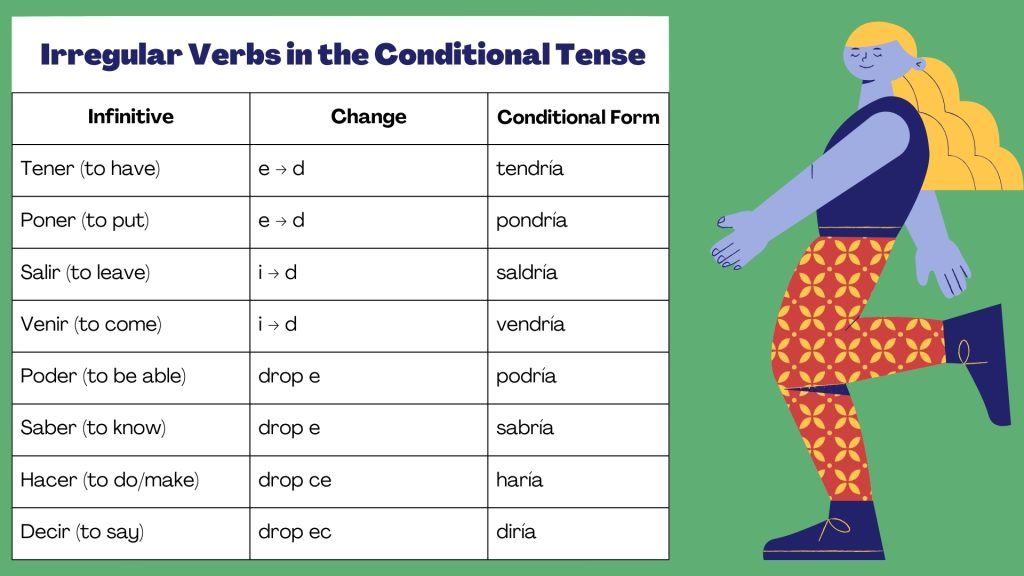
Once you have these new stems, you simply add the usual endings for the conditional tense: -ía, -ías, -ía, -íamos, -ían. So, you end up with forms like tendría, podrías, and vendríamos.
It’s like they have their own little twist on the rules, but once you get the hang of it, it’s not too complicated. Just remember those stem changes, add the right endings, and you’re all set.
| Infinitive | Change | Yo Form (Conditional) |
|---|---|---|
| Tener (to have) | e → d | tendría |
| Poner (to put) | e → d | pondría |
| Salir (to leave) | i → d | saldría |
| Venir (to come) | i → d | vendría |
| Poder (to be able) | drop e | podría |
| Saber (to know) | drop e | sabría |
| Hacer (to do/make) | drop ce | haría |
| Decir (to say) | drop ec | diría |
When to use the conditional tense
The conditional tense in Spanish helps us talk about ‘what if’ situations, make polite requests, and guess about past events.
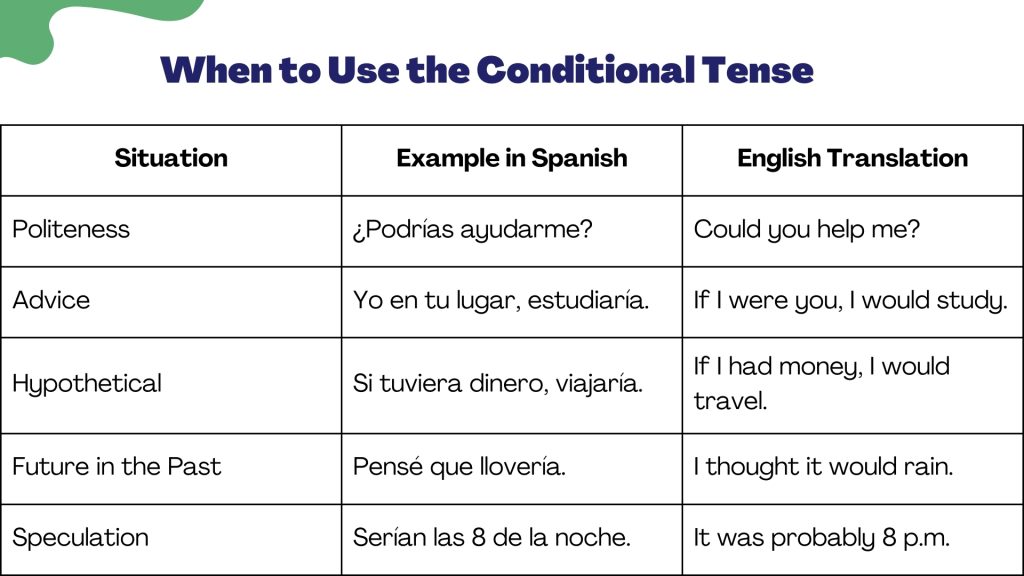
It makes our words softer and more polite, good for asking questions nicely or imagining different outcomes.
It’s also great for wondering about what might have happened in the past.
1. Politeness
| Spanish | English Translation |
|---|---|
| ¿Podrías ayudarme con esto? | Could you help me with this? |
| ¿Me dirías la hora, por favor? | Would you tell me the time, please? |
| Me gustaría un café, por favor. | I would like a coffee, please. |
| ¿Podría hablar con el gerente? | Could I speak with the manager? |
| ¿Sería posible cambiar la reserva? | Would it be possible to change the reservation? |
2. Giving Advice
| Spanish | English Translation |
|---|---|
| Yo en tu lugar, estudiaría más. | If I were you, I would study more. |
| Deberías descansar más. | You should rest more. |
| No lo haría si fuera tú. | I wouldn’t do it if I were you. |
| Yo que tú, pediría ayuda. | If I were you, I would ask for help. |
| Tendrías que ahorrar más dinero. | You should save more money. |
3. Hypotheticals
| Spanish | English Translation |
|---|---|
| Si tuviera más tiempo, viajaría. | If I had more time, I would travel. |
| Si hiciera calor, iríamos a la playa. | If it were warm, we would go to the beach. |
| Si fuera millonario, donaría dinero. | If I were a millionaire, I would donate money. |
| Si pudieras elegir, ¿dónde vivirías? | If you could choose, where would you live? |
| Con más dinero, compraríamos una casa. | With more money, we would buy a house. |
4. Future in the Past
| Spanish | English Translation |
|---|---|
| Ella dijo que llegaría tarde. | She said she would arrive late. |
| Pensé que haría calor hoy. | I thought it would be warm today. |
| Nos prometieron que nos ayudarían. | They promised they would help us. |
| Dijo que viajaría a España. | He said he would travel to Spain. |
| Creíamos que la tienda abriría temprano. | We believed the store would open early. |
5. Speculation
| Spanish | English Translation |
|---|---|
| Serían las 10 cuando salió. | It was probably 10 when he left. |
| Tendría unos 30 años. | He was probably about 30 years old. |
| Habría mucha gente en la fiesta. | There were probably many people at the party. |
| ¿Por qué no vino? Estaría ocupado. | Why didn’t he come? He was probably busy. |
| ¿Dónde estaría Juan ayer? | Where could Juan have been yesterday? |
Boost your language skills with Spanish Books for Beginners.
The Spanish Conditional Compound Tense
This tense helps you talk about things that would have happened if the past had been different. It’s made with haber in the conditional (habría, habrías, habría…) plus a past participle. People use it for regrets, missed chances, or imagining a different past. Let’s break it down.
Formula:
Conditional of haber + past participle
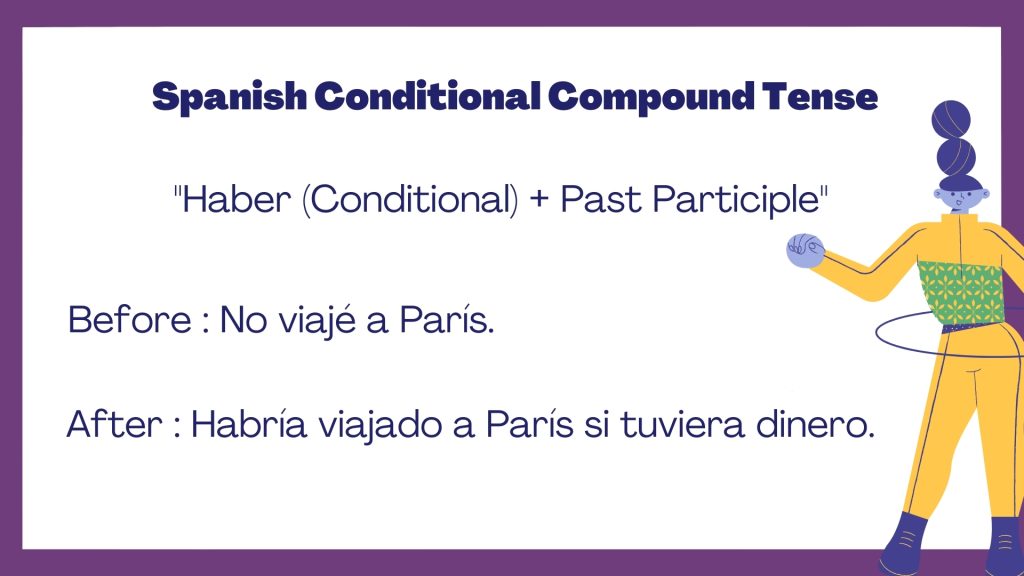
| Subject | Haber | Example: Hablar | Example: Escribir |
|---|---|---|---|
| Yo | habría | habría hablado | habría escrito |
| Tú | habrías | habrías hablado | habrías escrito |
| Él/Ella/Ud. | habría | habría hablado | habría escrito |
| Nosotros | habríamos | habríamos hablado | habríamos escrito |
| Vosotros | habríais | habríais hablado | habríais escrito |
| Ellos/Ellas/Uds. | habrían | habrían hablado | habrían escrito |
Past participle in Spanish (regular verbs)
Most verbs follow a simple rule. For -ar verbs, drop the ending and add -ado (hablar → hablado). For -er and -ir verbs, add -ido (comer → comido, vivir → vivido). Learn this, and you can use it for most verbs.
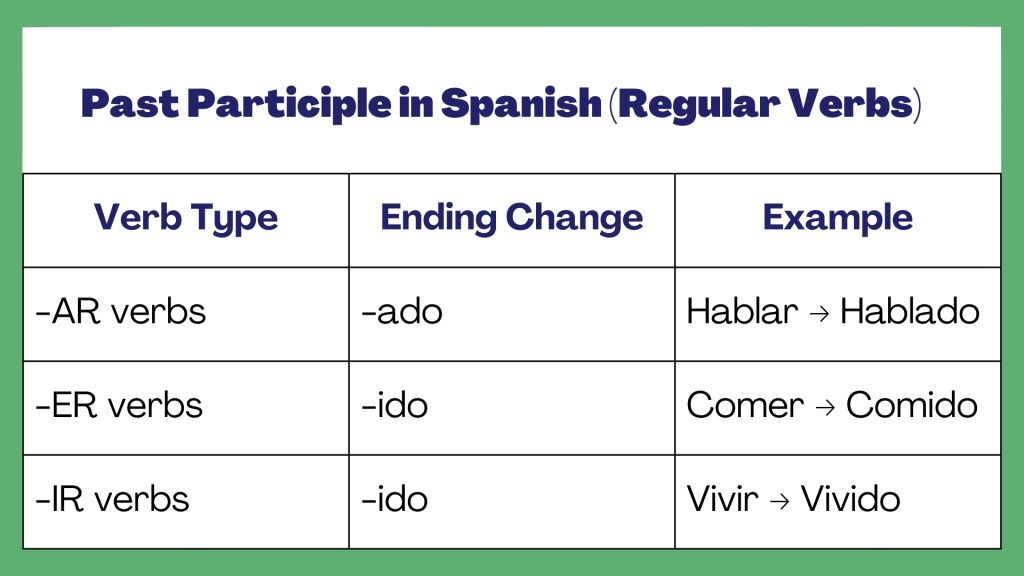
| Verb Type | Ending Change | Example |
|---|---|---|
| -AR verbs | -ado | Hablar → Hablado (spoken) |
| -ER verbs | -ido | Comer → Comido (eaten) |
| -IR verbs | -ido | Vivir → Vivido (lived) |
📌 Rule: No matter the subject, the past participle form stays the same.
Past participle in Spanish (irregular verbs)
Some verbs don’t follow the pattern. They change completely. Hacer becomes hecho. Ver turns into visto. Escribir changes to escrito. These show up a lot, so it’s good to know them.
| Infinitive | Past Participle | Example Sentence |
|---|---|---|
| Abrir (to open) | Abierto | He abierto la puerta. (I have opened the door.) |
| Decir (to say) | Dicho | Ella ha dicho la verdad. (She has told the truth.) |
| Escribir (to write) | Escrito | Han escrito una carta. (They have written a letter.) |
| Hacer (to do) | Hecho | Has hecho la tarea. (You have done the homework.) |
| Ver (to see) | Visto | Hemos visto la película. (We have seen the movie.) |
When to use the Compound conditional tense
Use it when talking about things that would have happened if the past had been different. Example: Habría ido a la fiesta, pero estaba enfermo (“I would have gone to the party, but I was sick”). It’s also handy for polite speech and storytelling. Mastering this tense helps you sound more natural in Spanish.
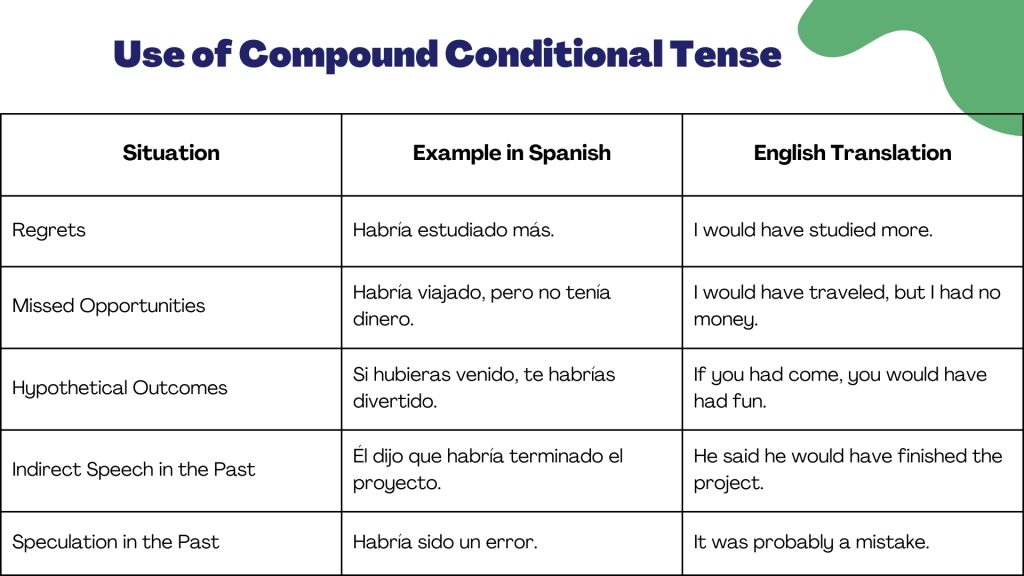
1. Regrets
| Spanish | English Translation |
|---|---|
| Habría estudiado más si hubiera sabido. | I would have studied more if I had known. |
| Habríamos llegado antes con mejor tráfico. | We would have arrived earlier with better traffic. |
| Habría comprado el coche si tuviera dinero. | I would have bought the car if I had money. |
| Habría aprendido español antes. | I would have learned Spanish earlier. |
| No habría dicho eso. | I wouldn’t have said that. |
2. Missed Opportunities
| Spanish | English Translation |
|---|---|
| Habría viajado más, pero no tenía tiempo. | I would have traveled more, but I didn’t have time. |
| Te habríamos invitado si hubieras llamado. | We would have invited you if you had called. |
| Habría aceptado la oferta, pero ya tenía un trabajo. | I would have accepted the offer, but I already had a job. |
| Habríamos ido al concierto si no lloviera. | We would have gone to the concert if it hadn’t rained. |
| Habría estudiado medicina si pudiera volver atrás. | I would have studied medicine if I could go back. |
3. Hypothetical Outcomes
| Spanish | English Translation |
|---|---|
| Si hubieras estudiado, habrías aprobado el examen. | If you had studied, you would have passed the test. |
| Si hubiéramos salido antes, habríamos evitado el tráfico. | If we had left earlier, we would have avoided the traffic. |
| Si hubiera sabido, no habría ido. | If I had known, I wouldn’t have gone. |
| Si hubieras entrenado más, habrías ganado. | If you had trained more, you would have won. |
| Si ellos hubieran trabajado más, habrían terminado a tiempo. | If they had worked more, they would have finished on time. |
4. Indirect Speech in the Past
| Spanish | English Translation |
|---|---|
| Él dijo que habría terminado el proyecto. | He said he would have finished the project. |
| Pensábamos que habríamos llegado antes. | We thought we would have arrived earlier. |
| Dijo que habría llamado si hubiera tenido tiempo. | He said he would have called if he had time. |
| Dijeron que habrían venido, pero estaban ocupados. | They said they would have come, but they were busy. |
| Pensé que habrías entendido la lección. | I thought you would have understood the lesson. |
5. Speculation in the Past
| Spanish | English Translation |
|---|---|
| Habría sido difícil para ellos. | It must have been difficult for them. |
| ¿Dónde habría ido después de la reunión? | Where could he have gone after the meeting? |
| Seguramente habría mucho tráfico. | There was probably a lot of traffic. |
| Habría sido un error. | It was probably a mistake. |
| No sé qué habría pensado ella. | I don’t know what she must have thought. |
Conclusion
To sum up, the Spanish Conditional Tense is really useful. It lets us talk about what could happen, ask for things nicely, and guess about stuff.
Once you get the hang of it, you can say more complicated things in Spanish. This makes your conversations richer and more polite, whether you’re chatting casually or in more formal situations.
Simply put, it’s a key part of speaking Spanish well.
Your learning journey continues at Lingua Viva.
Carolina is a charming and lively member of Lingua Viva with 11+ years of teaching experience. She loves to teach students appropriate ways to communicate effectively in Spanish without the fear of making mistakes. She holds a professional teaching license and has a graduate degree with emphasis in Foreign Language.







